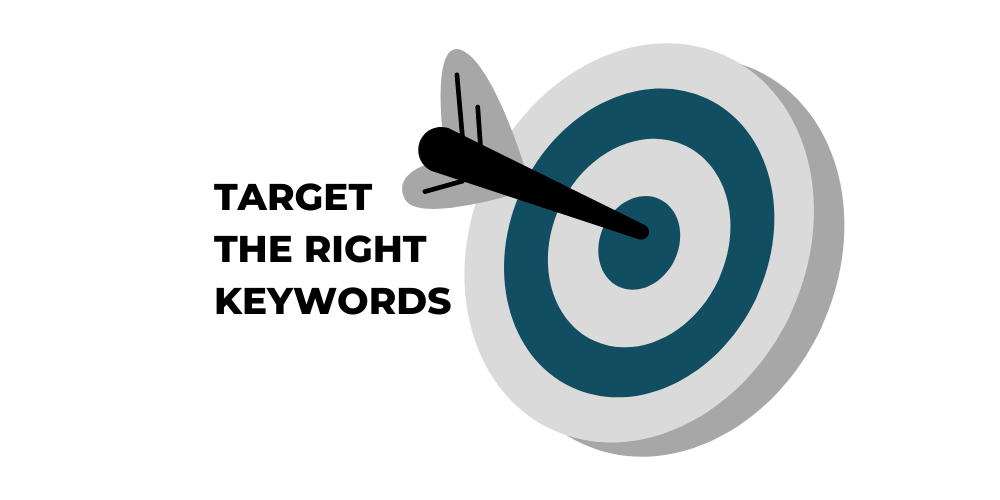
Ranking any website page high in SERPs requires a strong understanding of SEO best practices and a solid keyword strategy. Choosing the keywords best to target is one of the most prominent aspects of your SEO strategy that will make or break your website.
You need to choose keywords relevant to the content you produce, have a high search volume, and match the search intent of your target audience.
It may sound like a complicated process, but we’ll help you get the hang of it. Keep reading to learn which keywords are best to target, how to identify the right ones for you, and how to target your chosen ones.
Find the Best Keywords to Target
Website owners struggle with the biggest question regarding SEO: which keywords are best to target?
Endless keywords and variations exist for every niche, so it’s important to understand which ones are worth the effort of trying to rank for.
Here are a few questions you should ask yourself to determine whether keywords are worth ranking for.
- Are they relevant? The best keywords to target will be relevant to your content. Your keywords should be something that answers a question, solves a problem, or otherwise helps a customer or provides value to your target audience.
- Do they have a high search volume? Aim for keywords with a high search volume. Typically, you want keywords that have a minimum of 50-100 searches per month.
- Are there issues with the current search results? Do you notice any issues when you type your keyword into Google? Common problems you might notice that provide you an opportunity to rank high with your content include outdated results (6 months or older), short content (less than 800 words), forum results on the first search engine results page like Reddit or Quora, or irrelevant content.
You’re in business if you have keywords relevant to your content and a high search volume. Noticing issues when searching those keywords gives you an even better chance of ranking highly for them.
How to Identify Your Target Keywords
Identifying your target keywords involves plenty of keyword research. You’ll want to download a keyword research tool like SEMRush, Keywords Everywhere, or Moz to help you with this stage.
These simple browser extensions will make your research significantly easier! But before you begin using your keyword research tool, you’ll want to create a list of possible keywords.
The first step is to identify your niche. Then, think about what your content is offering your target audience. Determine what the search intent of your target audience is. Typically, you can group search intent into four categories; do, know, locate, and visit.
Identifying Search Intent
Are your customers trying to accomplish a goal (do), learn about something (know), locate a site (locate) or visit a specific location (visit)? Once you have the answer, you’ll understand your audience’s search intent.
Now that you’ve identified your niche and your audience’s search intent, it’s time to look at your list of possible keywords. Work off this list by typing each keyword into Google and using your keyword research tool to check vital stats.
Some things you’ll want to check for are:
- Domain authority. You have a better chance of ranking for the keyword if the currently ranking sites have a lower domain authority score than yours.
- Search volume. Ensure the keyword gets a minimum of 50-100 searches per month.
- Issues with current search results. Is there outdated or irrelevant content ranking for your keywords? Are forum websites popping up on page one? If so, you have a great opportunity to rank for that keyword!
Once you’ve identified which keywords are worth targeting, it’s time to create a plan. Work off your main keywords to find relevant adjacent keywords. This is also a good time to identify long-tail keywords that will work well with your content.
Make sure that while you’re creating groups of keywords and long-tail keywords, you remember to check for seasonal and current trending keywords. Different keywords go in and out of favor throughout the year, so make sure your content is coming out at the right time when the highest number of people are searching for it.
Implement Your Target Keywords
Targeting your keywords requires a solid plan. This would be an excellent time to create an SEO keyword map to organize your keywords and strategies used to rank for them. You can reevaluate your map periodically to see if you need to adjust your strategy or keywords.
Aside from creating a keyword map, there are some basic strategies you can implement right away to ensure your content starts ranking highly. The most important thing is to place your keywords strategically and organically throughout your content.
Make sure your main keyword appears in your H1 and H2s. Place it in your meta tags and URLs is also a good idea.
Use methods like internal linking to rank for relevant content with similar keywords. Internal linking will also help strengthen your domain authority score. Optimize your post by including other relevant keywords and long-tail keywords.
You can also use an SEO tool to help you identify how your content ranks compared to the competition’s. Tools like Yoast SEO and Ahrefs will help you learn how to incorporate keywords into your content to achieve a higher ranking.


